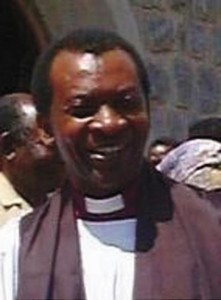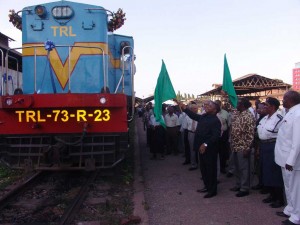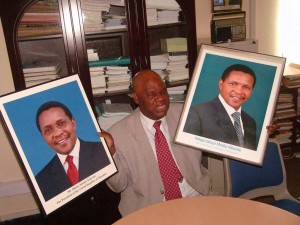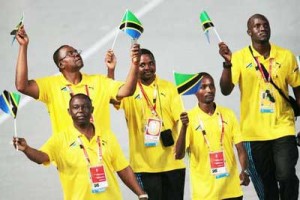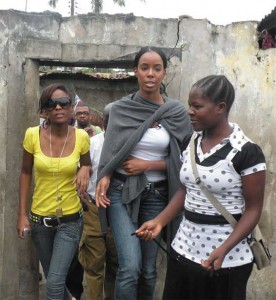(In order to make this section as interesting and representative as possible we welcome contributions from readers. If you see a mention of Tanzania in the journal, magazine or newspaper you read, especially if you live overseas or travel outside the UK/Tanzania, please send us the relevant item together with the name and date of the publication. We greatly value the many contributions we receive for this section of TA. – Editor)
Judith Melby writing in CHRISTIAN AID NEWS (Summer 2008) gave her view that Tanzania was not getting the financial returns it should be getting at the Geita Gold Mine: Extracts:
‘When Tanzania entered into contracts with mining companies in the 1990s, the World Bank was urging governments to develop private investments and provide incentives to attract foreign capital. Peter Kafumu, Commissioner for Minerals, says negotiating with the mining companies and their experienced lawyers was intimidating, and likened it to facing a traditional African weapon: “The companies are holding a panga by the handle and we are getting the sharp end.” Instead of reaping the rewards of a bonanza, Tanzania has lost hundreds of millions of pounds because the royalties levied on extracted gold are so low and mining companies have reportedly minimised their tax liability by inflating their losses.
AngloGold Ashanti’s (AGA) mine in Geita, one of Africa’s biggest open-cast mines, produced 308,000 ounces of gold in 2006 but AGA would only start paying corporation tax in 2011- 11 years after starting operations. Yet the company’s own annual reports showed that it made operating profits of US$93million from Geita between 2002 and mid-2007.
The residents of Geita had little to show for AGA’s gold boom. The town has few paved roads and intermittent electricity, and water is still drawn from wells. The town’s population has exploded from 20,000 to 120,000 as men flock there in search of work. Geita District Hospital was built in 1956 and probably has not seen much upgrading since. It is busy, with about 250 outpatients a day and 160 inpatients. Many wards have two patients to a bed…..’
‘Tanzania’s Environment Body Gets Tough on Developers.’ This is the heading of an article in the EAST AFRICAN (June 16) explaining that the National Environment Management Council (NEMC) has warned that development projects of almost all kinds must undertake environmental impact studies before launching projects. The Council stated its intention to take stern measures against any violations of the environmental law.
Vicky Ntetema writing in the July issue of the BBC’s FOCUS ON AFRICA explained how even Tanzania’s middle classes were now feeling the pinch as the prices of the main staple foods had gone up two fold in the past few months to 80 cents for a kilo of maize and $1 for a kilo of rice. The article quotes the case of 49-year-old pharmacist Joyce Mwasha who is fairly well paid, earning $700 a month at the city’s main hospital. Her husband is a forestry expert and together they can afford to send their son and daughter to boarding school. But they have noticed other price increases: meat is now $3 a kilo; it is $10 for a chicken and a kilo of cassava flour now costs 80 cents. She also has to spend between $60 and $100 on transport to work each month.
A highly-competitive student competition with £24,000 of prize money for the best ‘Big Idea’ (sponsored by the TIMES) attracted more than 1,000 entries from 68 universities around world. The paper reported that the winner was John Tilleman, the co-founder of ‘Solar Oven Systems’ which had developed a simple solar oven made from a piece of reflective plastic folded into a cone. Tilleman was reported to be in Tanzania to investigate the concept. He was hoping to use solar power to reduce deforestation – Thank you M. Anderson for sending this item – Editor.
According to EAST AFRICAN BUSINESS WEEK (February 25) data now being acquired in off-shore Tanzania has shown that it is possible that commercial production of petroleum oil and gas could be achieved as early as 2012. According to Dr. Philip Nelson, the Director of Petrodel Resources Ltd which has licences in Latham and Kimbiji there have been signs of “flat spots” and “bright spots” which are widespread in the seismic data from Nigeria’s oil-rich Niger Delta. These ‘spots’ are fundamental to the discovery, development, and production of oil and gas he said. Petrodel began its survey in February to collect seismic data. The company expected to begin similar surveys at the offshore sector in Tanga later – Thank you Keith Lye for sending this and other items -Editor.
AFRICA REPORT published in its April issue a list of the top 500 companies in Africa. Way out ahead at the top of the list is Sonatrach, an Algerian hydrocarbon company which is followed by South Africa’s Old Mutual insurance company. The only Tanzanian company on the list – at number 275 – is Vodafone Telecoms. 37 of the top 50 companies in the list are in South Africa.
The EAST AFRICAN (April 21) reported that the Olympic torch had arrived in Dar es Salaam from Argentina on the night of 12th April (see last issue of TA). The torch had a trouble free journey through the Tanzanian capital, the only African leg of the flame’s journey to Beijing. The 25 kilometre route had to be scaled down to five kilometres because of heavy rains that had pounded the city and flooded several sections of the rally route. The paper said that it was, to all intents and purposes, an all-Chinese affair as Chinese citizens working in East Africa turned up at the airport and lined the streets. Only a small crowd of Tanzanians were there at the periphery.
DEVELOPMENTS, published by the UK’s DIFID, highlighted in its Issue 4 of 2008 what it described as an unprecedented joint venture between the Japanese giant Sumitomo Chemical and A-Z Textiles in Arusha (see cover photo TA 0). Sumitomo are the creators of the ‘Olyset’ anti mosquito net – the first long-lasting, insecticide-treated nets which are guaranteed to last for at least five years. They never need re-treatment, are virtually tear-proof and can be washed up to 20 times while remaining effective. The non-toxic insecticide is contained within the fibre, not coated on the outside. The Arusha factory is now one of Tanzania’s largest employers with approximately 3,200 staff, mostly women – Thank you John Sankey for sending this – Editor.
‘Eco philanthropists are now buying up vast tracts of East Africa with little interest in commercial gain. Will this be the generation to rescue Africa’s wildlife and offer affluent consumers a true wilderness experience?’ This was the subject of an article in the FINANCIAL TIMES on 17th May by Lucia van der Post in which she described an ‘African miracle’ taking place in the north-west corner of the Serengeti. Extracts: ‘Just six years ago, this vital Western corridor of the reserve was a dismal hunting block with badly controlled hunting and poaching by the desperately poor population. It had now been transformed so that all its 346,000 acres were flourishing again under the beneficent eye of Wall Street fund manager Paul Tudor Jones. He has turned the area into ‘Singita Grumeti Reserves’ and made it one of the most sensationally luxurious safari destinations in Africa…. It has created jobs for some 600 people, offered educational scholarships and founded small businesses for neighbouring residents, to bring to this corner of Tanzania something of the prosperity that eco-tourism has brought to other places….. Nobody has any illusions that this eco-tourism can ever be made to pay its way. Keeping the costs down is the most that they are aiming for. Tudor Jones is rumoured to have poured some £45 million into the project and any future profit is to be directed to the ‘Grumeti Fund’ which helps villagers to set up small enterprises –Thank you Debbie Simmons for this – Editor.
A fun event reported in the WANTAGE HERALD (3rd July) comprised 20 specially created scarecrows scattered around the village of East Hagbourne and followed the heroes, heroines and villains theme of a church fete. It attracted a lot of attention. The objective was to raise funds to equip a hospital plus solar panels and equipment for schools in Liuli, Tanzania – Thank you Geoffrey Stokell for sending this – Editor.
The EAST AFRICAN (16th June) quoted the International Union for the Conservation of Nature’s Red List as describing a ‘grim’ roll-call of endangered species of birds around the world. Among the 1,226 species now threatened are the Sokoke Scops owls which feed mostly on insects such as beetles in the forests of coastal Kenya. But the birds are also found in the Usambara Mountains where a few hundred birds are still thought to reside. Global warming is affecting the bird population through long-term drought and sudden extreme weather which disrupts the natural environment of the birds.

